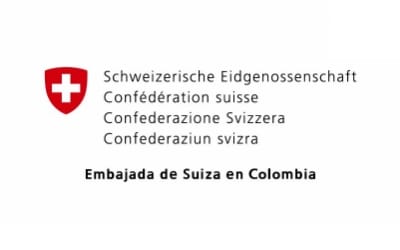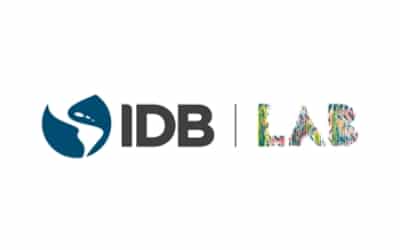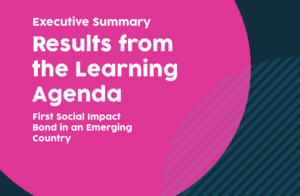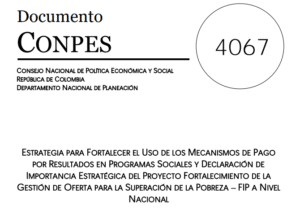Overview
Type of Project |
Long-term deep country systems change |
Strategic Pillar
|
1. Government Partnerships2. Empowerment Hub |
Sectors
|
∙ Workforce Development∙ Competitiveness,∙ Early Childhood Development∙ Migrants∙ Education∙ Recidivism∙ Rural Development |
Region |
Latin America and the Caribbean |
Country |
Colombia |
Abstract
Launched in 2012 out of a need to improve the effectiveness of public sector spending, Instiglio’s partnership with the Government of Colombia has focused on mainstreaming outcomes-based approaches into public policy through the design of RBF pilots, capacity building of public and private practitioners, and sustained advocacy. This long-standing partnership has created a vibrant pay-for-results ecosystem buoyed by networks of trained champions committed to improving the impact that public spending has on the lives of people in Colombia. This support has enabled the Government of Colombia to emerge as a global leader in Results-Based Financing (RBF), generating valuable lessons for practitioners both in the country and around the world.
Project
Partners




The issue
Despite having enjoyed more than two decades of social, economic, and political stability, Colombia faces a significant national poverty rate of 39.3% (2023) and one of the highest levels of inequality in the world, with a Gini Index of 51.5 (2021). Addressing these challenges requires effective government spending and public service delivery. However, the reality is that both the cost and the effectiveness of such initiatives are often unknown. Furthermore, the public policy cycle incentivizes stakeholders to set ambiguous and lukewarm targets, resulting in underperformance and an overall lack of accountability. The resulting situation is one of ineffective spending and a system that stifles the adoption and achievement of critical, lifesaving results. In response to these challenges, Instiglio and its local partners have, since 2012, worked to promote changes to the systems of public spending and service delivery with the goal of increasing outcomes.
The response
Since 2012, Instiglio has played a leading role in developing Colombia’s results-based financing (RBF) ecosystem. Working in partnership with the Social Impact Bond Program in Colombia (SIBs.CO formed by IDB Lab, the Swiss State Secretariat for Economic Affairs and Fundación Corona), among other stakeholders, it has undertaken the following key activities:
1. Piloting multiple RBF mechanisms.
We have contributed to the design and launch of seven outcomes-based mechanisms for the workforce development sector, including the first Social Impact Bond in a developing country and an Outcomes Fund within a public institution (Logra Outcomes Fund), two competitiveness RBF contracts as part of the Colombia + Competitiva Project, and a recidivism program with Fundación Acción Interna. These pilots have increased the impact and cost-effectiveness of interventions, demonstrating the potential of such approaches to improve service delivery, strengthening buy-in from key public and private organizations, and generating crucial learnings to guide future implementation.
2. Generating and sharing knowledge.
We have developed a number of learning agendas compiling lessons and best practices from the design and implementation of RBF mechanisms. We have also published articles and participated in multiple forums presenting insights from its experience in-country. By doing this, we have been able to support local and international actors to improve the effectiveness of their own public service delivery-focused initiatives.
3. Advocating and creating adequate conditions for the institutionalization of an outcomes-focused logic in public institutions.
We have successfully advocated for the institutionalization of results-based approaches, leading to the inclusion of RBF in the 2018-2022 and 2022-2026 National Development Plans, and the publication of a public policy framework focused on these mechanisms (CONPES 4067). This has paved the way for incentives to be integrated more systematically into public policy and service delivery. Additionally, we have worked with public-sector champions to incorporate RBF within government operations. This has led to the use of these mechanisms by institutions such as the Departamento de Prosperidad Social, the Mayor’s Office of Bogotá, and the Mayor’s Office of Cali.
4. Building the capacity of the market.
We have contributed to building the capacity of multiple stakeholders in the market through training, workshops, and courses. This has resulted in the creation of a network of practitioners focused on enhancing the effectiveness of public service delivery.
The impact
Outcomes-based approaches have gained momentum within the public and private sectors. Evidence of the impact of RBF mechanisms on employment outcomes has expanded interest in RBF, forming a community of champions and strengthening the national ecosystem. Importantly, they have demonstrated how incentives can be incorporated into governments’ procurement processes and the role that private providers and investors can play in upgrading the quality of services.
Some of the most notable achievements of our work include:
- The creation of a community of champions and practitioners, including:
- +6 government stakeholders, including the Mayor’s Offices of Bogota, Cali, and Medellin, the Departamento de Prosperidad Social, the National Planning Department, and the Instituto Colombiano de Bienestar Familiar.
- +14 investors.
- +8 bi/multilateral donors.
- +20 service providers.
- The adoption of RBF by government institutions, including the creation of an Outcomes Fund dedicated to launching government-designed RBF programs (Logra Outcomes Fund), and a workforce development program by the Mayor’s Office of Bogota aiming to help more than 12,000 people, focusing on women and youth.
- Channeling more than USD 7 million, including 6% of the impact investment in Colombia.
- Incentivizing +35,000 job placements.
- Promoting the engagement with RBF in multiple sectors, including workforce development, competitiveness, early childhood development, migrant support, rural development, climate, education, and recidivism.
Organizing an International RBF Congress with the participation of experts and key stakeholders from the local ecosystem and international partners.




